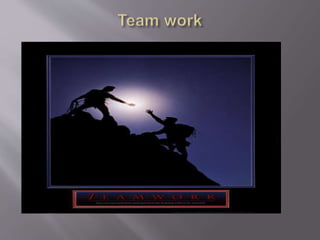
Team work
- 2. The process of working collaboratively with a group of people in order to achieve a goal. Two or more individuals with a high degree of interdependence geared toward the achievement of a goal or the completion of a task
- 3. Creates synergy Supports a more empowered way of working, removing constraints which may prevent someone doing their job properly. Promotes flatter and leaner structures, with less hierarchy. Fosters flexibility and responsiveness, especially the ability to respond to change. Promotes the sense of achievement, equity and camaraderie, essential for a motivated workplace. When managed properly, teamwork is a better way to work!
- 4. Makes decision Solve problems Provide solutions Accomplish the task/mission Plan’s
- 5. Clear goal is must Result driven structure Competent team members Must be committed High standard which is understood by all Motivation A principle leadership
- 6. Is there a difference between working as a group and in a team??
- 7. Groups Teams Members work independently and they often are not working towards the same goal. Members work interdependently and work towards both personal and team goals, and they understand these goals are accomplished best by mutual support. Members focus mostly on themselves because they are not involved in the planning of their group's objectives and goals. Members feel a sense of ownership towards their role in the group because they committed themselves to goals they helped create. Members are given their tasks or told what their duty/job is, and suggestions are rarely welcomed. Members collaborate together and use their talent and experience to contribute to the success of the team's objectives. Members are very cautious about what they say and are afraid to ask questions. They may not fully understand what is taking place in their group. Members base their success on trust and encourage all members to express their opinions, varying views, and questions. Members do not trust each other's motives because the do not fully understand the role each member plays in their group. Members make a conscious effort to be honest, respectful, and listen to every person's point of view. Members may have a lot to contribute but are held back because of a closed relationship with each member. Members are encouraged to offer their skills and knowledge, and in turn each member is able contribute to the group's success. Members are bothered by differing opinions or disagreements because they consider it a threat. There is not group support to help resolve problems. Members see conflict as a part of human nature and they react to it by treating it as an opportunity to hear about new ideas and opinions. Everybody wants to resolve problems constructively. Members may or may not participate in group decision- making, and conformity is Members participate equally in decision-making, but each member understands that the leader might need
- 8. Forming Storming Norming Performing
- 9. When a team is forming, members cautiously explore the boundaries of acceptable group behavior. They search for their position within the group and test the leader's guidance. It is normal for little team progress to occur during this stage
- 10. Storming is probably the most difficult stage for the group. Members often become impatient about the lack of progress, but are still inexperienced with working as a team. Members may argue about the actions they should take because they faced with ideas that are unfamiliar to them and put them outside their comfort zones. Much of their energy is focused on each other instead of achieving the goal.
- 11. During this stage team members accept the team and begin to reconcile differences. Emotional conflict is reduced as relationships become more cooperative. The team is able to concentrate more on their work and start to make significant progress.
- 12. By this stage the team members have discovered and accepted each other's strengths and weaknesses, and learned what their roles are. Members are open and trusting and many good ideas are produced because they are not afraid to offer ideas and suggestions. They are comfortable using decision making tools to evaluate the ideas, prioritize tasks and solve problems. Much is accomplished and team satisfaction and loyalty is high.
- 13. Someone is on vacation Someone is sick/injured but working Someone is late Someone is mad/angry/upset/emotional Production has been increased/busy Someone is a semi-non-participant
- 14. Everyone has a bad day Everyone has a full plate Everyone has problems, heartache, happiness and great days You are responsible to take good care of yourself You can make a difference, even if ever so slight
- 15. Appreciation for value of team decisions Respect for team members Mutual trust Openness to feedback Reflection on group process and interest in improving Shared vision
- 16. The most selfish one letter word........... I … Avoid it The most selfish one letter word........... WE….. Use it The most poisonous three-letter word..... EGO……kill it
- 17. The most used four-letter word Love………… Value it The most pleasing five-letter word Smile …keep it The fastest spreading six-letter word Rumour….ignore it
- 18. The hardest working seven-letter word……. "SUCCESS…. Achieve it The most enviable eight-letter word.... JEALOUSY … Distance it The most powerful nine-letter word.... Knowledge…..Acquire it The most essential ten-letter word Confidence …. Trust it